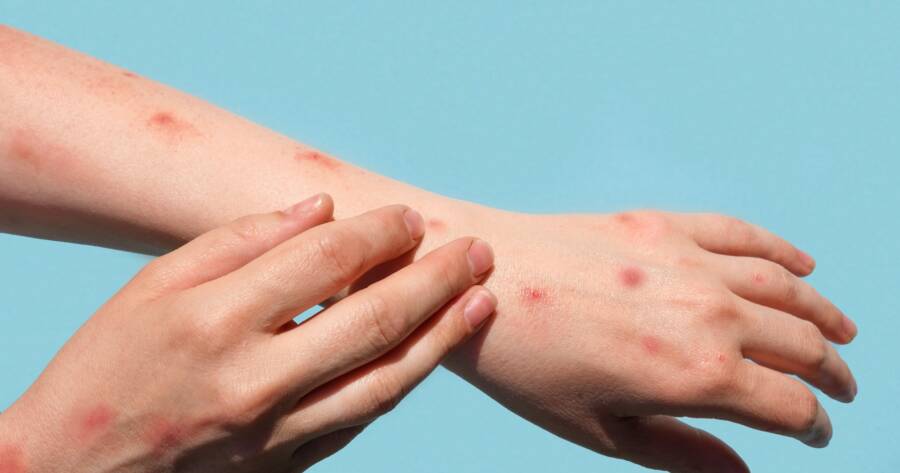Mpox (formerly called Monkeypox) is a rare disease caused by the monkeypox virus. Although it is not as common as other illnesses, it can still spread to humans with a high risk of death. Understanding how monkeypox spreads can help you stay safe and protect others. Fortunately, if you’re looking for ways to reduce your risk of infection, you can learn how monkeypox spreads right now.
Direct Contact with an Infected Person
The most common way monkeypox spreads is through direct contact with an infected person. When someone has monkeypox, their skin may develop rashes, blisters, or sores. If you touch these areas or any bodily fluids, you could catch the virus. 1 This is especially true if you have an open cut or sore on your skin, as the virus can enter your body more easily.
Even if the infected person doesn’t have visible symptoms, you can still get monkeypox from them. The virus can also spread through respiratory droplets when you are in close contact with someone who has it. This usually happens when you are within three feet of an infected person and talk, cough, or sneeze near them. Wearing masks and avoiding close contact with people who show symptoms can help reduce your risk.
Contact with Contaminated Objects
Another way monkeypox can spread is through contact with objects that have been touched by an infected person. This includes bedding, towels, clothing, or any other surface that may have come into contact with their skin or fluids. The monkeypox virus can survive on these objects for a while, making it possible to catch the virus even if the infected person isn’t nearby.
It’s important to wash your hands regularly and avoid sharing personal items with others. If you know someone who has monkeypox, do not share their bedding, towels, or clothing. Cleaning and disinfecting surfaces in your home can also help stop the spread of the virus.
Animal-to-Human Transmission
While the risk of contracting mpox is fairly remote, the virus can spread through surprising hosts. The disease was first discovered in monkeys, but many animals, including rodents and squirrels, can carry the virus and transmit it to humans. If you handle an infected animal, get bitten or scratched, or come into contact with its bodily fluids, you could become infected.
Hunters and people who work closely with animals are at higher risk of catching monkeypox. To protect yourself, avoid contact with wild animals, especially those that appear sick. If you must handle animals, wear protective clothing, gloves, and a mask. Make sure to wash your hands thoroughly after dealing with animals, especially if they are wild or unfamiliar.
Preventing the Spread of Monkeypox
Although monkeypox can spread in several ways, there are steps you can take to reduce your risk. First, practice good hygiene by washing your hands often with soap and water. Hand sanitizer can also be used if soap and water are not available. As mentioned above, don’t get too close to people who are sick (or their belongings) without proper protective equipment.
Safer sex behavior is also very important when looking to reduce your risk of contracting mpox. Intimate contact with anyone showing symptoms like rashes, sores, or blisters can spread the disease. Limiting your number of sexual partners and avoiding sexual activity in uncontrolled environments (such as sex parties or bathhouses) can help you stay safe. 2
If you work with animals, make sure to wear protective gear and take extra precautions when handling them. Avoid touching animals that look sick or are acting strangely. If you notice any symptoms of monkeypox in yourself or others, seek medical attention right away.
Monkeypox Vaccines Are Available
If you’re especially anxious about mpox, vaccination is another way to protect yourself. Not everyone needs the vaccine, it is recommended for people in certain groups, such as healthcare workers, those who handle animals, or individuals living in areas with active outbreaks.
The vaccine can help prevent infection or reduce the severity of symptoms if you are exposed. If you are unsure whether you need the monkeypox vaccine, talking to your healthcare provider can help you weigh your personal risk factors.
Learn More About Monkeypox
Monkeypox may not be as common as other diseases, but it’s important to understand how it spreads. Direct contact with an infected person, contaminated objects, and animal-to-human transmission are the main ways people catch the virus.
By practicing good hygiene, avoiding close contact with sick people, and being careful around animals, you can reduce your risk of infection. Staying informed and taking simple steps can help you and your loved ones stay safe from monkeypox.
